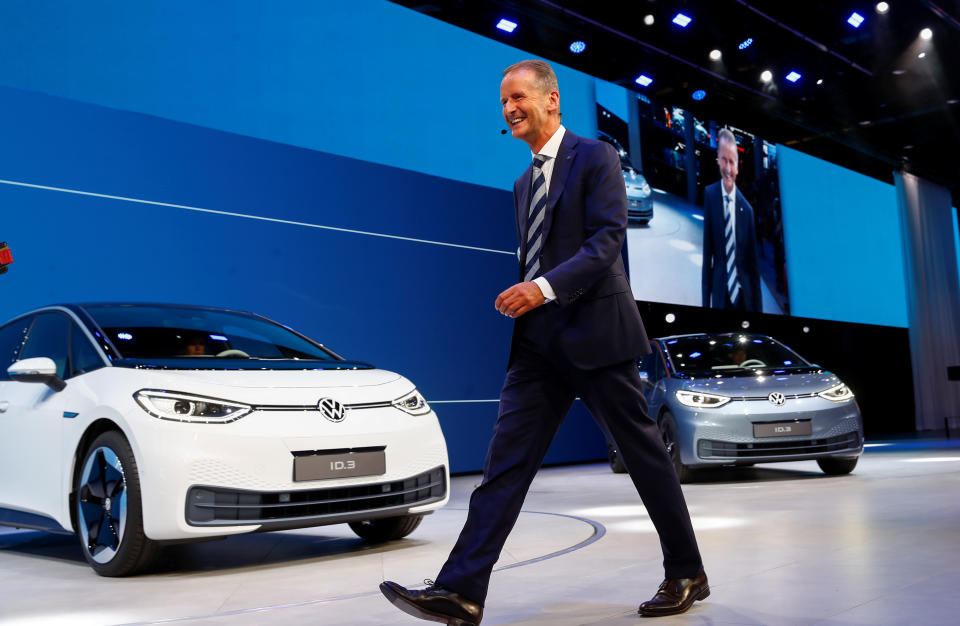Volkswagen rebrands and wheels out its new mass-market car

Almost four years to the day when Volkswagen’s (VOW.DE) massive emissions-cheating scandal — dubbed “Dieselgate” — shook the industry, the German carmaker premiered a new brand identity and a new electric car in Frankfurt on Monday evening.
VW heralded this as a new start for the company, and the beginning of the “third chapter,” claiming it will do for mass electro-mobility what the Beetle and the Golf did back in the day by making affordable cars for all.
VW unveiled its new 2-D logo (to replace the current 3-D blue-and-sliver one) and said the new brand identity was about being “friendly,” “empathic,” and “feminine” and drove the new ID.3 electric car onto the stage on the eve of the Frankfurt motor show.
“The car has a big future,” said VW CEO Herbert Diess. He said that this evening was a key moment for VW and the kickoff of its huge electro offensive.
VW said tonight that the ID.3 will start at under €30,000 (£27,000, $32,935). The first special edition of the car is limited to a run of only 30,000 units.
READ MORE: Volkswagen partners with Amazon to drive up productivity
The German car group, which paid €30bn (£27bn, $33bn) in fines connected to its diesel scandal, will invest around the same amount of money by 2023 to power its electric transformation. It aims to launch some 70 electric models in the next decade, putting 22 million e-cars on the streets.
The ID models will be the first ones built on Volkswagen’s new modular electric platform (MEB). Production will begin at the Zwickau plant in eastern Germany in November. The huge plant in Zwickau has been undergoing a massive refit to convert if from a combustion-car factory to an electric one, and will be the biggest electric car factory in Europe.
First deliveries are planned for summer 2020, VW said. It will come in different battery sizes, delivering driving ranges of between 330km (205 miles) and 420km, with charging time around 290km in half an hour.
All these cars need batteries, and Europe’s scarcity of domestic battery cell producers— Asia dominates the global market — is giving carmakers and governments anxiety.
READ MORE: Volkswagen says making electric cars will lead to job cuts
Volkswagen said earlier this month that the group is going to need more than 150 Gigawatt hours from 2025 in Europe alone. It announced in June that it was investing €900 m into a joint venture with Sweden’s Northvolt to build a battery plant in Salzgitter, Germany. Construction is set to start next year, and cell production for VW should begin around the end of 2023.
German economy minister Peter Altmaier said on Friday that “Germany and Europe need to develop and build competitive, innovative and environmentally sustainable battery cells.”
The German economy ministry said the EU in talks about creating a second EU battery-cell production consortium, and Germany is putting up €1bn for subsidies to back the initiatives.

 Yahoo Finance
Yahoo Finance 